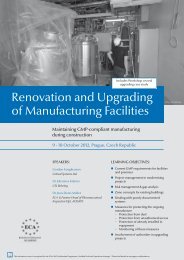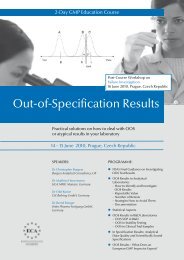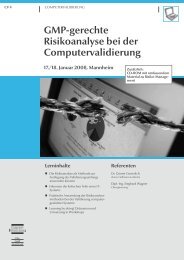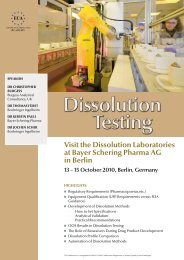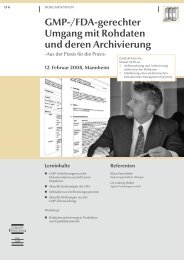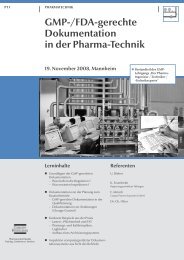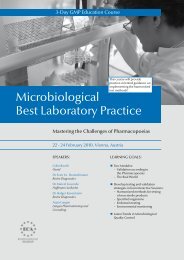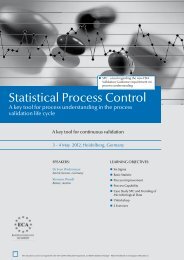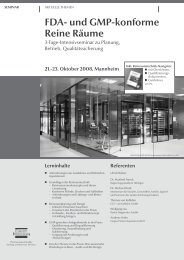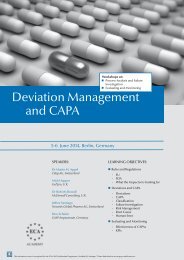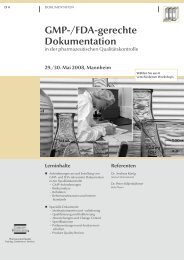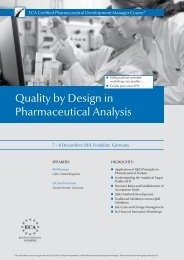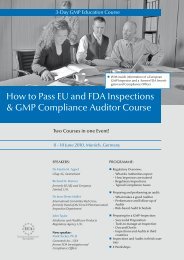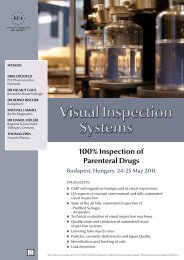ceutical Packaging Materials
ceutical Packaging Materials
ceutical Packaging Materials
You also want an ePaper? Increase the reach of your titles
YUMPU automatically turns print PDFs into web optimized ePapers that Google loves.
Save € 300,- and book both courses simultaneously!<br />
Quality Control<br />
Compliance Week<br />
4 - 7 May 2009, Vienna, Austria<br />
Quality Control of<br />
Raw <strong>Materials</strong><br />
4-5 May 2009, Vienna, Austria<br />
� Regulatory Requirements for APIs and<br />
Excipients<br />
� Current GMP Requirements for APIs,<br />
Excipients and Drug Products<br />
� Laboratory Organisation<br />
� Pharmacopoeias<br />
� Sampling of Incoming APIs and Excipients<br />
� Reduced Testing of Supplied APIs<br />
and Excipients<br />
� Analytical Methods<br />
� NIR (Near InfraRed Spectroscopy) for an<br />
Efficient Control of Raw <strong>Materials</strong><br />
QC and QA of Pharma-<br />
<strong>ceutical</strong> <strong>Packaging</strong> <strong>Materials</strong><br />
6-7 May 2009, Vienna, Austria<br />
� Regulatory Requirements on Pharma<strong>ceutical</strong><br />
<strong>Packaging</strong> <strong>Materials</strong>: EU and US<br />
� Instrument Calibration and Qualification<br />
in the QC <strong>Packaging</strong> Laboratory<br />
� Defect Evaluation Lists<br />
� Control of Dimensions / Control of Printed<br />
<strong>Packaging</strong> <strong>Materials</strong><br />
� IR for <strong>Packaging</strong> <strong>Materials</strong>: Benefits and Limits<br />
� cGMP-Compliant Documentation of<br />
<strong>Packaging</strong> Control Activities<br />
� Sampling and Testing of <strong>Packaging</strong><br />
<strong>Materials</strong> - Practical Examples<br />
� Testing of Extractables/Leachables
Quality Control of Raw <strong>Materials</strong><br />
4 – 5 May 2009, Vienna, Austria<br />
Objectives<br />
Testing active pharma<strong>ceutical</strong> ingredients and excipients<br />
is one of the main tasks of the quality control units in the<br />
pharma<strong>ceutical</strong> industry. It must be ensured that the necessary<br />
tests are conducted on the incoming goods and<br />
that the starting materials are released only after their<br />
quality was judged as satisfactory. This GMP Education<br />
Course about the incoming goods control of APIs and<br />
excipients will give you a comprehensive overview of the<br />
specific tasks and questions of the „raw materials lab“<br />
and show you real-life solutions and answers.<br />
This course will deal among others with the following<br />
questions:<br />
� Who is responsible for the release or rejection of starting<br />
materials?<br />
� How can the incoming goods lab be organised efficiently?<br />
� Which SOPs are necessary?<br />
� In which cases can test results be taken over from the<br />
supplier‘s certificate of analysis?<br />
� Do all test items of a pharmacopoeial monograph<br />
have to be analysed?<br />
� Are the pharmacopoeial monographs similar, or must<br />
different tests be conducted for PhEur, USP and JP?<br />
� Can a pharmacopoeial test method be replaced by an<br />
alternative test method? Does this require a variation<br />
application?<br />
It is the aim of this GMP Education Course to give answers<br />
to these and many other important questions relating<br />
to the testing of APIs and excipients and to serve as a<br />
forum for an intensive experience exchange.<br />
Target Group<br />
This Education Course is directed at all those employees<br />
from quality control units in the pharma<strong>ceutical</strong> industry<br />
(including heads of quality control and laboratory managers)<br />
who are competent or responsible for sampling,<br />
testing and release of the starting materials used (= APIs<br />
and excipients).<br />
This course is also of interest to personnel from quality<br />
assurance and to those employees from API and excipient<br />
manufacturers who want to inform themselves about<br />
the requirements of the pharma<strong>ceutical</strong> industry on the<br />
testing of these starting materials.<br />
Programme<br />
Regulatory Requirements for APIs and Excipients<br />
�<br />
�<br />
�<br />
�<br />
�<br />
�<br />
Definition of APIs and excipients<br />
EU Requirements<br />
FDA Requirements, e.g. FDA Draft Guidance “Drug<br />
Product”<br />
Common Technical Document (CTD)<br />
Certification Procedures:<br />
- EDQM Certificate of Suitability<br />
- Active Substance Master File<br />
- US - Drug Master File<br />
Quality Standard: How to discern a good starting<br />
material from a bad one?<br />
DR RETO THEISS, Merck KGaA<br />
Current GMP Requirements for APIs, Excipients and<br />
Drug Products<br />
� Relevant ICH guidelines<br />
� EU regulations for Drug Products and API<br />
� GMP for excipients – current expectations<br />
� IPEC (International Pharma<strong>ceutical</strong> Excipients Council)<br />
Guideline for excipients<br />
� Upcoming EU GMP regulation for excipients<br />
� GMP aspects of supplier/manufacturer qualification<br />
DR THOMAS STORM, Novartis Pharma AG<br />
Laboratory Organisation<br />
� Role of the raw materials laboratory within the pharma<strong>ceutical</strong><br />
supply chain<br />
� Optimization of the analytical laboratory with respect<br />
to costs, time and resources (economic order size,<br />
costs of analysis vs stock keeping costs, involvement of<br />
RM suppliers in the SC)<br />
EMERICH GRASSINGER, Boehringer Ingelheim<br />
Pharmacopoeias<br />
�<br />
�<br />
�<br />
�<br />
�<br />
�<br />
�<br />
Regulatory background<br />
Pharmacopoeial institutions – Ph.Eur., USP/NF, JP<br />
CEPs<br />
Implementation of pharmacopoeial monographs in<br />
your laboratory<br />
Multi-compendial testing<br />
Validation of pharmacopoeial testing methods<br />
New USP General Chapter Verification of<br />
Compendial Methods<br />
DR THOMAS STORM, Novartis Pharma AG<br />
Sampling of Incoming APIs and Excipients<br />
� Regulatory requirements<br />
� Are the requirements the same for active and excipients?<br />
� Sampling plans<br />
� Training<br />
� GMP-compliant documentation of sampling operations<br />
� Practical examples<br />
EMERICH GRASSINGER, Boehringer Ingelheim
WORKSHOP I<br />
Sampling<br />
� Examples for generating sample procedures<br />
� How to deal with the unexpected?<br />
� How to deal with deviations on the delivery like incorrect<br />
temperature control, stacked up pallets, etc.?<br />
Moderator:<br />
EMERICH GRASSINGER, Boehringer Ingelheim<br />
Reduced Testing of Supplied APIs and Excipients<br />
� What guidance is available on reduced QC testing?<br />
� EU- and FDA expectations?<br />
� Supplier qualification as a prerequisite<br />
� Other information required before you start reducing<br />
� Can APIs and excipients be covered within the same<br />
approach?<br />
� Who is in the driver seat, who must be involved?<br />
� Practical execution<br />
DR RETO THEISS, Merck KGaA<br />
WORKSHOP II<br />
Reduced Testing<br />
Apart from any guidance, it is still much up to the manufacturer<br />
to decide which APIs and which excipients<br />
might be subject of a reduced testing procedure. Since<br />
the quality of the substance has to be assured without<br />
compromise, multiple factors must be considered before<br />
the full testing of every single batch can be reduced.<br />
It is the aim of this workshop to exchange information<br />
about different approaches and to discuss their<br />
advantages and disadvantages respectively considering<br />
the actual guidance as well as their practicability.<br />
Moderator: DR RETO THEISS, Merck<br />
Analytical Methods<br />
�<br />
�<br />
�<br />
�<br />
Use and validation of non-compendial methods<br />
How to proof comparability?<br />
Advantages of instrumental methods versus visual<br />
methods<br />
Handling of deviations (Out-of-Specification results<br />
and complaints)<br />
CAPA process<br />
Measurement system analysis<br />
Documentation<br />
Retests<br />
�<br />
�<br />
�<br />
�<br />
EMERICH GRASSINGER, Boehringer Ingelheim<br />
NIR (Near InfraRed Spectroscopy) for an Efficient<br />
Control of Raw <strong>Materials</strong><br />
� A short introduction to NIR Spectroscopy<br />
� NIR as a pharmacopoeial monograph<br />
� NIR for single container identification<br />
� Costs vs. benefit<br />
ARMIN GROH, Nycomed GmbH<br />
Speakers<br />
Emerich Grassinger<br />
Boehringer Ingelheim Pharma GmbH & Co.KG,<br />
Ingelheim, Germany<br />
Emerich Grassinger started at Boehringer Ingelheim<br />
as the head of an analytical laboratory in the<br />
API production. Since 2006 he is responsible for<br />
the Raw Material laboratory in which the testing and release of<br />
the API`s and excipients is carried out. In this function he is<br />
further more responsible for the sampling of the Raw <strong>Materials</strong>.<br />
Armin Groh<br />
Nycomed GmbH, Singen, Germany<br />
Armin Groh works as head of laboratory in the<br />
QC unit of Nycomed in Singen, Germany. He is<br />
responsible for various analytical methods like<br />
HPLC, GC, FT-IR and FT-NIR, titrations, and other<br />
pharmacopoeial methods.<br />
Dr Reto Theiß<br />
Merck KGaA, Darmstadt, Germany<br />
Dr. Reto Theiß started in 1997 at Temmler Pharma<br />
in Marburg. In 1999 he became deputy Head of<br />
Temmler’s Quality Control department. In 2002<br />
he changed to Merck in Darmstadt serving as QP<br />
responsible for releasing products of the generic branch for the<br />
market. Since January 2005 his duties include the QA supervision<br />
of solid dosage forms during the whole production chain.<br />
Dr Thomas Storm<br />
Novartis Pharma AG, Basel, Switzerland<br />
Thomas Storm studied Chemistry and Physics,<br />
PhD in Environmental Technology, TU Berlin.<br />
Worked since 2001 as Head of Laboratory in<br />
Analytical Development at Schering AG / Bayer<br />
Schering Pharma AG, Berlin. Joined Novartis in 2008 as Head<br />
of Laboratory in Inhalation Development and Technology.<br />
Work areas included quality control of excipients, introduction<br />
of novel excipients, supplier qualification, quality control for<br />
development candidates, electronic raw data archival, HPLC,<br />
HPLC/MS, CDS, and, recently, inhalation specific analytics.<br />
Social Event<br />
At the end of the first course day you are cordially invited to a<br />
social event. This is an excellent opportunity to share your<br />
experiences with colleagues from other companies in a relaxed<br />
atmosphere.
Quality Control and Quality Assurance of Pharma<strong>ceutical</strong> <strong>Packaging</strong> <strong>Materials</strong><br />
6 – 7 May 2009, Vienna, Austria<br />
Learning Goals<br />
The focus of this GMP Education Course is on the presentation<br />
of concrete tests for packaging materials, as<br />
carried out in every incoming-goods laboratory of the<br />
pharma<strong>ceutical</strong> quality control. Among these are sampling<br />
and determining the necessary random sampling<br />
sizes, the use of infrared spectroscopy, the control of dimensions<br />
and the control of printed packaging materials,<br />
including the GMP-compliant documentation of these<br />
packaging control activities. The impact of the new requirements<br />
of EU Annex 19 on packaging material reference<br />
samples will also be discussed.<br />
Background<br />
There is a great number of regulatory requirements on<br />
pharma<strong>ceutical</strong> packaging materials, in the pharmacopoeias,<br />
the GMP regulations, in the FDA guidances, etc.<br />
The pharma<strong>ceutical</strong> manufacturer has to guarantee that<br />
only such packaging materials are used that are correctly<br />
printed, in conformity with the specifications and in<br />
compliance with the regulatory requirements.<br />
The quality control unit is responsible for the control of<br />
pharma<strong>ceutical</strong> packaging materials including the receipt,<br />
identification, sampling, testing, and approval or<br />
rejection of drug product containers and closures.<br />
In order to determine the scope of the tests for the quality<br />
control of pharma<strong>ceutical</strong> packaging materials, in<br />
some countries the „Defect Evaluation Lists“ have proved<br />
efficient. The responsibility for the tests lies now more<br />
and more with the manufacturers of packaging materials.<br />
However, as a precondition for this, additional QA<br />
measures, like vendor qualification, supplier audit and<br />
technical agreements, have to be taken.<br />
It is the objective of this seminar to describe the GMP<br />
requirements on packaging materials, the sampling of<br />
packaging materials and the control of incoming packaging<br />
materials comprehensively and to illustrate them with<br />
the help of examples.<br />
Target Group<br />
This GMP Education Course on the testing of pharma<strong>ceutical</strong><br />
packaging materials is directed at employees in<br />
pharma<strong>ceutical</strong> quality control departments who are responsible<br />
for sampling, testing, approval and control of<br />
primary and secondary packaging materials.<br />
The Course is also intended for quality assurance personnel<br />
as well as for staff of manufacturers and suppliers of<br />
packaging materials.<br />
Moderator<br />
Dr Jörg Zürcher, Bayer Schering Pharma AG, Germany<br />
Programme<br />
Regulatory Requirements on Pharma<strong>ceutical</strong> <strong>Packaging</strong><br />
<strong>Materials</strong><br />
� Regulatory framework<br />
� US Federal Register, Code of Federal Regulations (CFR)<br />
� US Guidance for Industry: Container Closure Systems<br />
� EC Guidance: Plastic Immediate <strong>Packaging</strong> <strong>Materials</strong><br />
� US Drug Master Files<br />
� EC legislation, Eudralex, foodstuff regulations<br />
Dr Mayk Kresse, Bayer Schering Pharma AG<br />
Equipment Calibration and Qualification in Pharma<strong>ceutical</strong><br />
<strong>Packaging</strong> Control<br />
� Principles of instrument qualification, calibration and<br />
analytical method validation in the QC laboratory<br />
� DQ, IQ, OQ, PQ<br />
� Examples of instrument qualification in the QC packaging<br />
laboratory<br />
Dr Helmut Gaus, Rentschler Biotechnologie GmbH<br />
Defect Evaluation Lists<br />
� General principles and specific Defect Evaluation Lists<br />
(DEL)<br />
� Random Sampling Tables for qualitative and for<br />
time-consuming, destructive and quantitative tests<br />
� Acceptable Quality Level<br />
� “Applied DEL” – LIMS-supported routine release testing<br />
� Sample defects and their classification<br />
Dr Mayk Kresse, Bayer Schering Pharma AG<br />
WORKSHOP I<br />
Examples of Defect <strong>Packaging</strong> <strong>Materials</strong><br />
The aim of this workshop is to discuss in small discussion<br />
groups the evaluation of some defect packaging materials<br />
that are presented. Are the defects of these packaging<br />
materials critical or non-critical? Has the lot to be rejected<br />
or can it still be used?<br />
Participants will learn how to apply the general recommendations<br />
of accepted and published Defect Evaluation<br />
Lists for specific and individual packaging materials.<br />
Moderator: Dr Mayk Kresse<br />
Control of Dimensions<br />
� Control of dimension for packaging materials<br />
- Overview over systems/equipment<br />
- Measuring screws, digital measuring slides, dial gauges<br />
- Measuring microscope<br />
- Contour projector<br />
- Perthometer<br />
� Requirements on measuring devices in daily use at<br />
the incoming control for packaging materials:
- Monitoring and calibration of testing equipment<br />
� Special applications<br />
Dr Gerald Kindermann, F. Hoffmann-La Roche AG<br />
Documentation of <strong>Packaging</strong> Control<br />
� Regulatory background<br />
� Set-up of specifi cations<br />
� Testing procedures<br />
� Documentation<br />
Dr Jörg Zürcher, Bayer Schering Pharma AG<br />
Infrared Spectroscopy for <strong>Packaging</strong> <strong>Materials</strong><br />
� Principle of the method<br />
� Pharmacopoeial background<br />
� Identity testing by IR<br />
� Quantitative analysis by IR<br />
� Method evaluation (benefi ts and limits)<br />
Dr Jörg Zürcher, Bayer Schering Pharma AG<br />
Testing of Extractables/Leachables<br />
� Regulatory background<br />
� Principles of Extractable and Leachable testing<br />
� Potential Extractables of different Container <strong>Materials</strong><br />
� Routine Testing of Extractables<br />
Dr. Jörg Zürcher, Bayer Schering Pharma AG<br />
WORKSHOP II<br />
Strategies for Reduced Testing<br />
The aim of this workshop is to evaluate in small discussion<br />
groups how the opportunities and requirements<br />
of EU Annex 8 and 21 CFR Part 211.84 should be implemented<br />
in the everyday practice of pharma<strong>ceutical</strong><br />
quality control departments for packaging materials.<br />
Moderator: Dr Gerald Kindermann<br />
Control of Printed <strong>Packaging</strong> <strong>Materials</strong><br />
� Control of incoming imprinted packaging materials<br />
- Yes? How? What?<br />
� Overview of imprinted packaging materials for pharma<strong>ceutical</strong><br />
operations<br />
� Requirements on the performance of imprinted packaging<br />
materials testing:<br />
- Sampling plan, performance of sampling and control<br />
of incoming packaging materials<br />
- Certifi ed suppliers - a high-producing cooperation<br />
- Experiences with the control of imprinted packaging<br />
materials<br />
Dr Gerald Kindermann, F. Hoffmann La Roche AG<br />
Quality Testing of <strong>Packaging</strong> <strong>Materials</strong>:<br />
Practical Examples<br />
� Sampling tables, test procedures and acceptance criteria<br />
for the incoming inspection of various packaging<br />
materials, e.g.<br />
- Bottles and caps, plastic fi lms and foils, glass, syringes<br />
and carpules, rubber stoppers, tubes<br />
Dr Helmut Gaus, Rentschler Biotechnologie GmbH<br />
Reference Samples of <strong>Packaging</strong> <strong>Materials</strong><br />
� Requirements of EU-GMP Guide Annex 19<br />
� Consequences for <strong>Packaging</strong> <strong>Materials</strong><br />
Dr Gerald Kindermann, F. Hoffmann La Roche AG<br />
Social Event<br />
On the evening of the fi rst course day you are cordially<br />
invited to a social event. This is an excellent opportunity<br />
to share your experiences with colleagues from other<br />
companies in a relaxed atmosphere.<br />
Speakers<br />
Dr Helmut Gaus, Rentschler Biotechnologie<br />
GmbH, Laupheim, Germany<br />
Dr Gaus started at Merckle/ratiopharm, in<br />
2001 he took over at Novartis-Generics, the<br />
position of Qualifi ed Person and Head of<br />
Quality Control. From 2003 to 2006 he was<br />
Head of Quality Control at Vetter Pharma. Since 2006 he<br />
is Qualifi ed Person and Vice President Quality Control at<br />
Rentschler Biotechnologie. Within his various positions in<br />
the pharma<strong>ceutical</strong> industry the incoming inspection of<br />
packaging components was always part of his responsibility.<br />
Dr Gerald Kindermann, F. Hoffmann-La Roche<br />
AG, Basle, Switzerland<br />
Dr. Kindermann joined Roche in 1996. From<br />
2001 to 2003 he led the group for control of<br />
incoming packaging materials at Roche<br />
Kaiseraugst (galenical production). His area<br />
of responsibility covered release analysis of packaging<br />
materials, the technical control of all packaging materials,<br />
and change control of specifi cations and analytical<br />
methods. He then became Quality Manager for the<br />
Supply Centre Kaiseraugst, and has been responsible for<br />
the quality aspects of a SAP project at Roche within<br />
Europe. 2008 he joined the Global Quality group at<br />
Roche working on quality systems.<br />
Dr Mayk Kresse, Bayer Schering Pharma AG,<br />
Berlin, Germany<br />
Dr Kresse joined the packaging department<br />
of Schering in 1998. Main fi elds of work were<br />
Quality Control, Quality Assurance <strong>Packaging</strong><br />
and <strong>Packaging</strong> Development. Since 2003 he<br />
has been heading the packaging development team for<br />
solid dosage forms within Pharma<strong>ceutical</strong> Development.<br />
Main task is the development of state-of-the-art packaging<br />
solutions in compliance with pharma<strong>ceutical</strong>, legal/<br />
regulatory, technical and economical requirements.<br />
Dr Jörg Zürcher, Bayer Schering Pharma AG,<br />
Berlin, Germany<br />
Dr Jörg Zürcher is responsible for the development<br />
of containers and packaging materials<br />
at Schering since 1990. He started as a<br />
scientist with focus on immediate container<br />
development for all dosage forms. Since 2002 he is<br />
leading the group responsible for development of all<br />
packaging components for liquid and parenteral dosage<br />
forms.
Easy Registration<br />
Reservation Form:<br />
� CONCEPT HEIDELBERG<br />
P.O. Box 10 17 64<br />
69007 Heidelberg,<br />
Germany<br />
Quality Control of Raw <strong>Materials</strong><br />
Date<br />
Monday, 4 May 2009, 9.00 h – 18.00 h<br />
(Registration and coffee 8.30 h – 9.00 h)<br />
Tuesday, 5 May 2009, 9.00 h – 16.30 h<br />
Fees<br />
EU GMP Inspectorates € 845.- per delegate plus VAT<br />
ECA Members € 1,521.- per delegate plus VAT<br />
APIC members € 1,605,- per delegate plus VAT (does<br />
not include ECA membership)<br />
Non-ECA Members € 1,690.- per delegate plus VAT<br />
The conference fee is payable in advance after<br />
receipt of invoice and includes conference documentation,<br />
dinner on the first day, lunch on both<br />
days and all refreshments. VAT is reclaimable.<br />
Quality Control and Quality Assurance of<br />
Pharma<strong>ceutical</strong> <strong>Packaging</strong> <strong>Materials</strong><br />
�<br />
Date<br />
Wednesday, 6 May 2009, 09.00 h - 18.30 h<br />
(Registration and Coffee 8.30 h - 9.00 h)<br />
Thursday, 7 May 2009, 08.30 h - 16.30 h<br />
Fees<br />
EU GMP Inspectorates € 845.- per delegate plus VAT<br />
ECA Members € 1,521.- per delegate plus VAT<br />
APIC members € 1,605,- per delegate plus VAT (does<br />
not include ECA membership)<br />
Non-ECA Members € 1,690.- per delegate plus VAT<br />
The course fee is payable in advance after receipt<br />
of invoice and includes conference documentation,<br />
dinner on the first day, lunch on both<br />
days and all refreshments. VAT is reclaimable.<br />
If the bill-to-address deviates from the specification<br />
to the right, please fill out here:<br />
CONCEPT HEIDELBERG<br />
P.O. Box 10 17 64<br />
Fax +49 (0) 6221/84 44 34<br />
69007 Heidelberg<br />
Germany<br />
Reservation Form:<br />
+ 49 6221 84 44 34<br />
Venue of both events<br />
Renaissance Wien Hotel<br />
Linke Wienzeile/Ullmannstr. 71<br />
1150 Vienna, Austria<br />
Phone + 43 / 1 89 102<br />
Fax + 43 / 1 89 102 300<br />
Do you want to save money?<br />
Accommodation<br />
CONCEPT has reserved a limited number of<br />
rooms in the conference hotel. You will receive<br />
a room reservation form when you have registered<br />
for the event. Please use this form for your<br />
room reservation or be sure to mention “VA<br />
5944/5951 ECA Course” to receive the specially<br />
negotiated rate for the duration of your stay.<br />
Reservation should be made directly with the<br />
hotel not later than 4 April 2009. Early reservation<br />
is recommended.<br />
Registration<br />
e-mail: @ info@concept-heidelberg.de � Internet:<br />
www.gmp-compliance.org<br />
Via the attached reservation form, by e-mail or<br />
by fax message. Or you register online at www.<br />
gmp-compliance.org.<br />
Conference language<br />
The official conference language will be English.<br />
Organisation and Contact<br />
CONCEPT HEIDELBERG<br />
P.O. Box 10 17 64<br />
D-69007 Heidelberg, Germany<br />
Phone +49 (0) 62 21/84 44-0<br />
Fax +49 (0) 62 21/84 44 34<br />
info@concept-heidelberg.de<br />
www.concept-heidelberg.de<br />
For questions regarding content:<br />
Dr Günter Brendelberger (Operations<br />
Director) at phone +49-62 21 / 84 44 40,<br />
or per e-mail at<br />
brendelberger@concept-heidelberg.de.<br />
For questions regarding reservation, hotel,<br />
organisation etc. (Quality Control of Raw<br />
<strong>Materials</strong>):<br />
Ms Marion Grimm (Organisation Manager) at<br />
+49-62 21 / 84 44 18, or per e-mail at<br />
grimm@concept-heidelberg.de.<br />
For questions regarding reservation, hotel,<br />
organisation etc. (Quality Control and Quality<br />
Assurance of Pharma<strong>ceutical</strong> <strong>Packaging</strong><br />
<strong>Materials</strong>):<br />
Ms Marion Weidemaier (Organisation Manager)<br />
at phone +49-62 21 / 84 44 46, or per e-mail at<br />
weidemaier@concept-heidelberg.de.<br />
Reservation Form (Please complete in full)<br />
Quality Control Compliance Week, 4-7 May 2009, Vienna Austria<br />
� Quality Control of Raw <strong>Materials</strong>, 4-5 May 2009<br />
� Quality Control and Quality Assurance of Pharma<strong>ceutical</strong> <strong>Packaging</strong> <strong>Materials</strong>, 6-7 May 2009<br />
(Please tick)<br />
* Mr * Ms<br />
Title, first name, surname<br />
Company<br />
Department<br />
Important: Please indicate your company’s VAT ID Number Purchase Order Number, if applicable<br />
Street / P.O. Box<br />
City Zip Code<br />
Country<br />
Phone / Fax<br />
E-Mail (Please fill in)<br />
General terms and conditions<br />
If you cannot attend the conference you have two options:<br />
1. We are happy to welcome a substitute colleague at any time.<br />
2. If you have to cancel entirely we must charge the following processing fees: Cancellation<br />
� until 2 weeks prior to the conference 10 %,<br />
� until 1 weeks prior to the conference 50 %<br />
� within 1 week prior to the conference 100 %.<br />
CONCEPT HEIDELBERG reserves the right to change the materials, instructors, or speakers without<br />
notice or to cancel an event. If the event must be cancelled, registrants will be notified as soon as<br />
If you book the complete Quality Control<br />
Compliance Week from 4 to 7 May 2009<br />
you will save € 300,-<br />
possible and will receive a full refund of fees paid. CONCEPT HEIDELBERG will not be responsible for<br />
discount airfare penalties or other costs incurred due to a cancellation.<br />
Terms of payment: Payable without deductions within 10 days after receipt of invoice.<br />
Important: This is a binding registration and above fees are due in case of cancellation or non-appearance.<br />
If you cannot take part, you have to inform us in writing. The cancellation fee will then<br />
be calculated according to the point of time at which we receive your message. In case you do not<br />
appear at the event without having informed us, you will have to pay the full registration fee, even if<br />
you have not made the payment yet. Only after we have received your payment, you are entitled to<br />
participate in the conference (receipt of payment will not be confirmed)!



